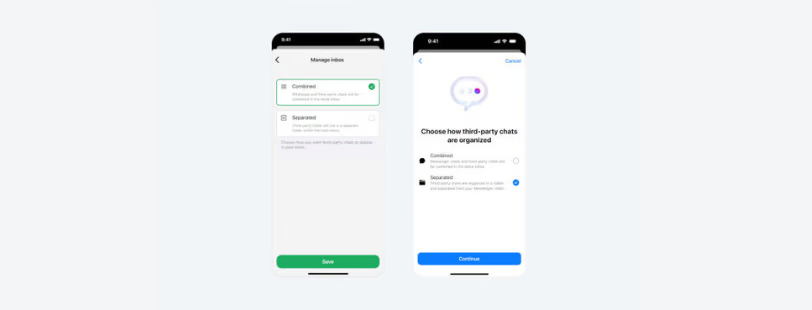
WhatsApp & Messenger: Revolutionizing European Messaging with Interoperability
In the realm of digital communication, WhatsApp and Messenger have long reigned supreme, shaping how we connect with friends, family, and colleagues. However, a seismic shift is underway in Europe, as these messaging giants are poised to redefine the way we interact with other apps. WhatsApp Messenger interoperability Europe
The Digital Markets Act (DMA), a landmark piece of EU legislation, has spurred WhatsApp and Messenger to embrace interoperability. This means that these platforms will now be able to seamlessly integrate with other messaging apps, offering users a more flexible and connected communication experience.
Breaking Down the Barriers: Key Features of Interoperability
- Third-Party App Notifications: Users will receive notifications about available third-party chat options, empowering them to make informed choices.
- Seamless Integration: Users can authorize interoperability with their preferred messaging apps, enabling smooth communication across platforms.
- Flexible Message Routing: Users can choose to receive messages from other apps in a separate inbox or merge with their existing WhatsApp or Messenger chats.
- Advanced Features: Beyond the core requirements of the DMA, WhatsApp and Messenger are offering additional features like reactions, direct replies, typing indicators, and read receipts.
- Future Enhancements: The companies have pledged to introduce group chats and voice/video calls by 2025 and 2027, respectively.
The Implications of Interoperability
The move towards interoperability has far-reaching implications for both users and the messaging landscape.
Benefits for Users
- Increased Choice: Users gain the freedom to choose the messaging app that best suits their needs and preferences.
- Enhanced Connectivity: Interoperability breaks down communication silos, making it easier to stay connected with a wider range of people.
- Improved User Experience: Seamless integration and advanced features contribute to a more enjoyable and efficient messaging experience.
Impact on the Messaging Industry
- Competition and Innovation: The increased competition fostered by interoperability could drive innovation and improvements in messaging services.
- Market Consolidation: Some smaller messaging apps may face challenges as larger platforms gain a competitive edge.
- Data Privacy Concerns: The sharing of data between different messaging apps raises questions about privacy and security.
Challenges and Considerations
While the benefits of interoperability are significant, there are also challenges to be addressed.
- Technical Complexity: Implementing interoperability requires complex technical solutions, which may present challenges for both platforms and third-party apps.
- User Adoption: Ensuring that users are aware of and adopt the new interoperability features will be crucial for its success.
- Data Privacy and Security: Protecting user data while facilitating interoperability is a delicate balancing act.
The Future of Messaging
The introduction of interoperability marks a watershed moment for the messaging industry. It has the potential to revolutionize how we communicate, offering users greater choice, flexibility, and connectivity.
As WhatsApp and Messenger continue to evolve and expand their interoperability capabilities, we can expect to see even more exciting developments in the years to come.
Summary
In conclusion, the interoperability of WhatsApp and Messenger with other messaging apps in Europe represents a significant step forward. By breaking down barriers and providing users with more choice and flexibility, this move has the potential to reshape the way we communicate. While challenges remain, the benefits of interoperability far outweigh the drawbacks. As we look to the future, it is clear that the messaging landscape is undergoing a profound transformation.










